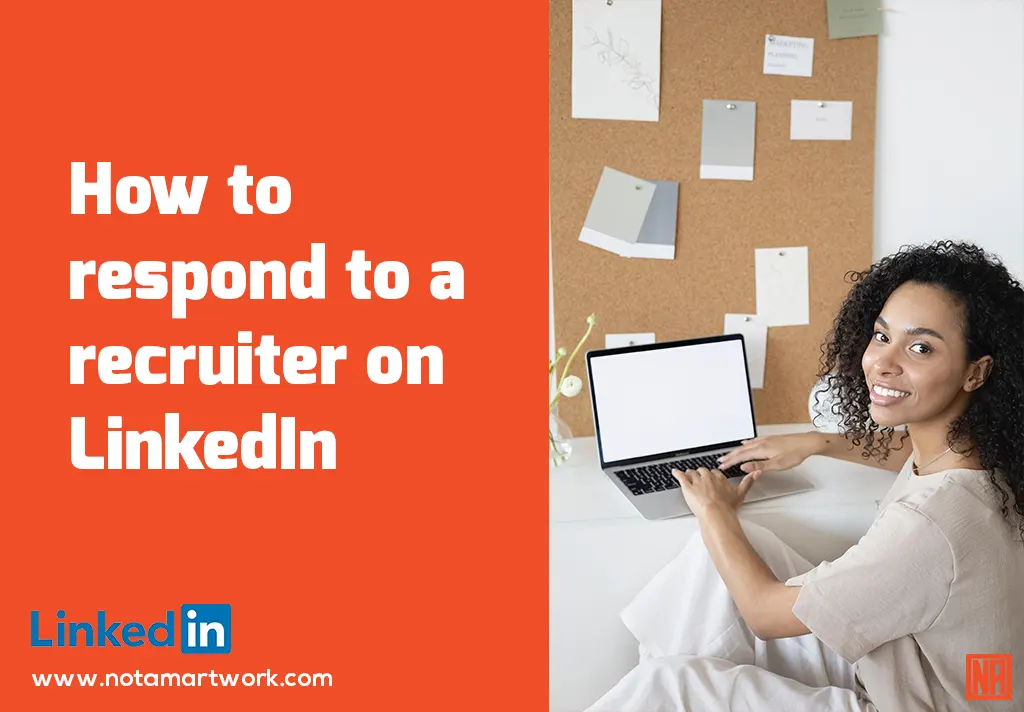LinkedIn is a robust platform that connects professionals from different fields and industries. It is a tool to showcase your skills and accomplishments and a place to explore new career opportunities. One of the most common ways recruiters approach potential candidates on LinkedIn is through direct messages.
These messages can be a game-changer for your career if you respond to them correctly. However, responding to a recruiter’s statement can be daunting, especially if you need help approaching the conversation.
In this blog, we will provide helpful tips on responding to a recruiter on LinkedIn and making the most of this valuable opportunity.
Should I respond to recruiters on LinkedIn?
Whether or not you should respond to LinkedIn messages depends on the context and the content of the message. Suppose the news is a genuine inquiry or job opportunity that interests you.
In that case, it is essential to respond promptly and professionally. Ignoring a message or failing to react swiftly could reflect poorly on your brand and potentially miss out on valuable career opportunities.
However, you are not obligated to respond if the message is spam, irrelevant, or inappropriate. It’s always a good idea to be mindful of who you connect with on LinkedIn and to take the time to review any message before responding. Responding to LinkedIn messages can be valuable for building professional connections and advancing your career.
Understanding the Recruiting Process
LinkedIn is a popular professional networking platform that has become an essential tool for recruiters. Here is a brief overview of the recruiting process on LinkedIn:
- Create a job posting: The first step is to create a job posting on LinkedIn. This can be done by selecting the “Post a job” button on the LinkedIn homepage.
- Source candidates: Recruiters can search for potential candidates on LinkedIn using various filters such as job title, location, skills, and experience. They can also reach out to potential candidates directly.
- Screen candidates: After identifying potential candidates, recruiters can review their LinkedIn profiles to determine if they meet the basic qualifications.
- Reach out to candidates: Recruiters can message potential candidates through LinkedIn’s messaging system to invite them to apply or schedule an interview.
- Interview candidates: Once candidates have been identified and screened, recruiters can schedule interviews using LinkedIn’s scheduling tool.
- Evaluate candidates: After interviews, recruiters can evaluate and decide to hire. They can also provide feedback to candidates through LinkedIn’s messaging system.
Discuss the different types of messages you might receive from recruiters
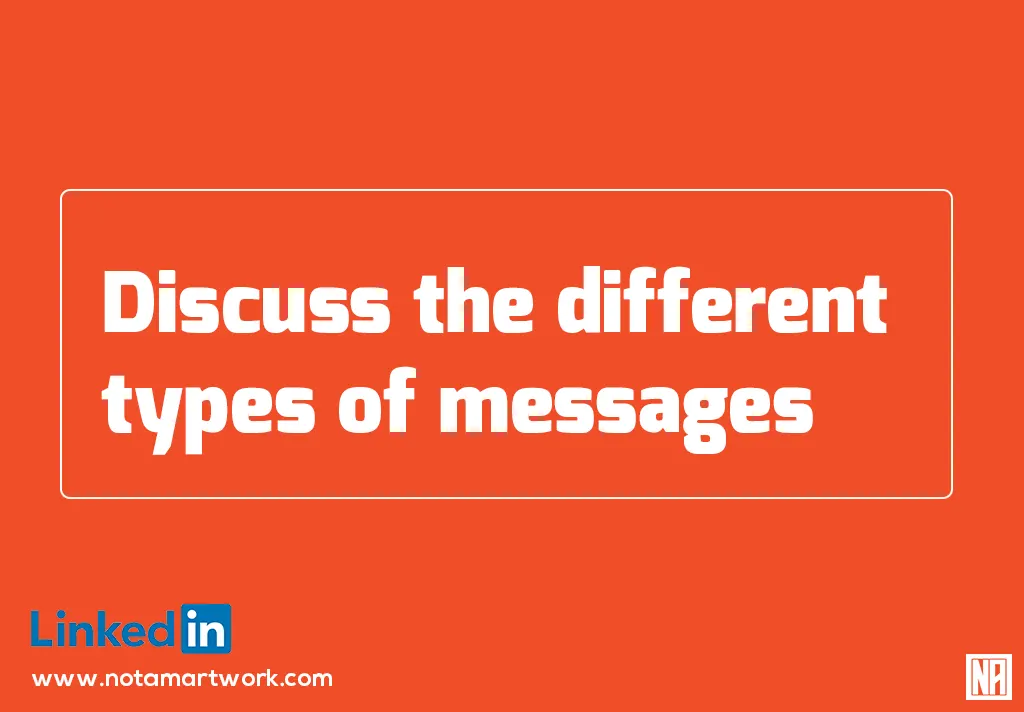
Recruiters may use various messages to reach out to potential candidates, depending on the stage of the recruiting process and the level of interest they have in the candidate. Here are some of the common types of messages you might receive from recruiters:
- Job postings: Recruiters may share job postings that match your skills and experience. These messages typically provide information about the job requirements and instructions on how to apply.
- Initial outreach: Recruiters may send you a message introducing themselves and their company, expressing interest in your background, and asking if you would be interested in exploring potential job opportunities.
- Interview invitations: Once recruiters have reviewed your profile and determined that you meet the qualifications for a specific job, they may send you an invitation to interview for the Position.
- Follow-up messages: After an interview or other communication, recruiters may follow up with you to provide feedback, ask additional questions, or give an update on the recruiting process.
- Job offer: If selected as the top candidate for a position, the recruiter may send you an offer letter with the job details, including compensation and benefits.
It’s important to note that not all messages from recruiters will be relevant or appropriate for your job search. As a job seeker, you should carefully review each statement and determine if it aligns with your career goals before responding.
Responding to a Recruiter’s Message
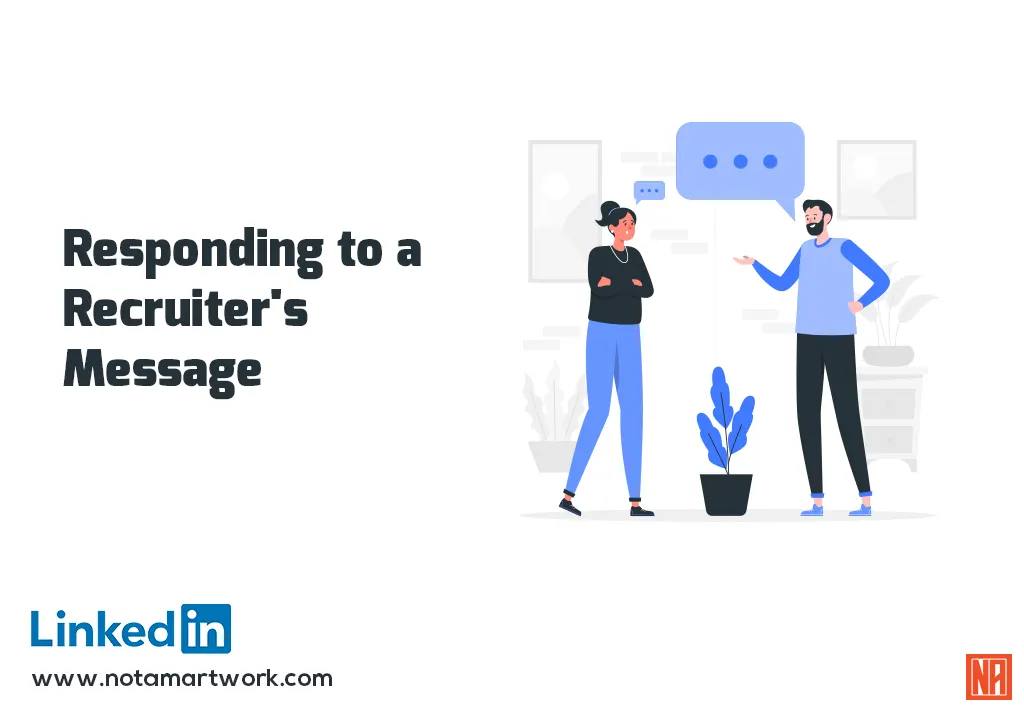
When responding to a recruiter’s message on LinkedIn, it is essential to remember that this could be a valuable opportunity for your career advancement. Here are some tips on how to respond professionally and effectively:
Reading the message carefully is essential when responding to a recruiter’s message on LinkedIn. Here are some things to keep in mind when reading the news:
Please pay attention to the details: Carefully read the recruiter’s message and the details they provide, such as the job title, company name, and location.
Look for keywords: Keywords in the recruiter’s message can give you an idea of what skills and qualifications they are looking for. Make sure to take note of any keywords that stand out.
Consider the context: The context of the message can help you understand the recruiter’s intentions. For example, if the message is sent to a large group of people, it may be generic.
Suppose the news is personalized and tailored to your specific skills and experience. In that case, it may indicate a genuine interest in you.
Identify any questions or requests: Look for any questions or requests the recruiter may have made in the message. Make sure you understand them so you can respond appropriately.
By reading the recruiter’s message carefully, you can better understand the opportunity they are presenting and craft an informed and effective response.
Tips for crafting a professional and polite response
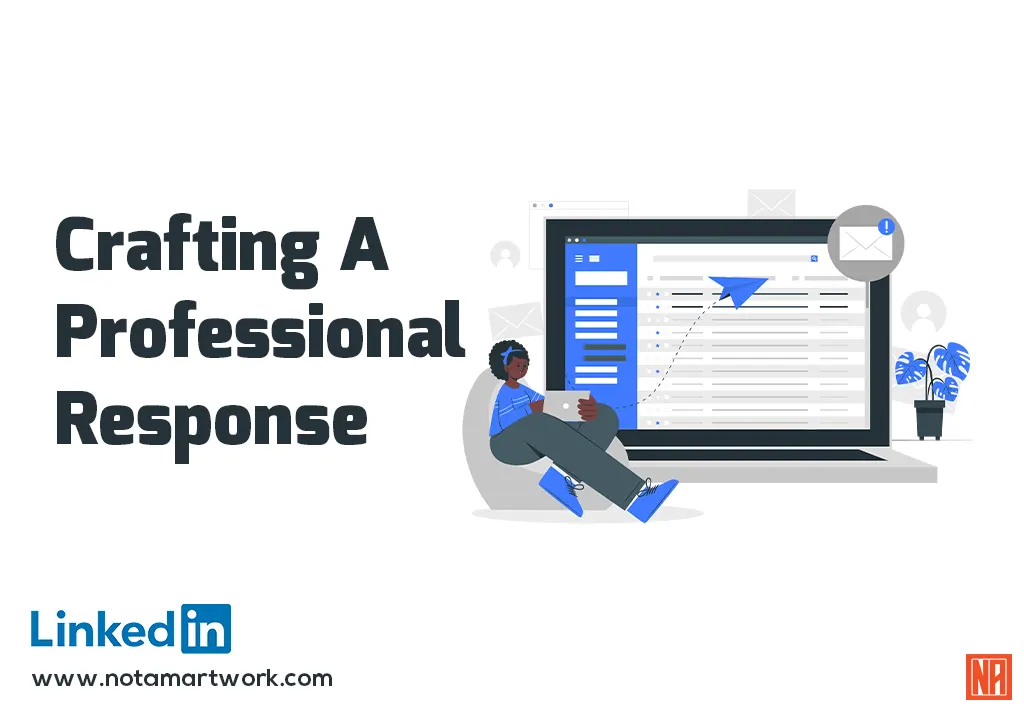
An experienced and polite response to a recruiter’s message on LinkedIn is crucial in creating a positive impression and opening the door to new career opportunities.
Here are some tips to help you create a response that is professional and effective:
- Start with a greeting: Begin your response with a polite greeting, such as “Hello” or “Hi [Recruiter’s Name].”
- Thank the recruiter: Express gratitude for the recruiter’s interest in you and the opportunity they are presenting. A simple “Thank you for reaching
- Show your interest: If you are interested in the opportunity, express your interest positively and enthusiastically. For example, “I’m excited to learn more about this opportunity and how I can contribute to your team.”
- Ask for more details: If the recruiter needs to provide more information about the job opportunity, politely ask for more details. This will help you understand whether the job is a good fit for your skills and experience. For example, “Could you please provide more details about the job responsibilities and requirements?”
- Be honest: If you are not interested in the job opportunity, be honest and decline the offer politely. For example, “Thank you for considering me for this opportunity. However, at this time, I am not interested in pursuing this opportunity.”
- Close with a positive note: End your response with a positive note, such as “I look forward to hearing back from you” or “Thank you again for considering me for this opportunity.”
By following these tips, you can create a professional, polite, and effective response to a recruiter’s message on LinkedIn.
How to ask for more information about the job opportunity
Asking for more information about a job opportunity on LinkedIn to a recruiter is essential before deciding whether to pursue the opportunity. Here are some tips on how to ask for more information in a professional manner:
Express gratitude: Begin by thanking the recruiter for contacting you and presenting the job opportunity. This will help establish a positive tone for the conversation.
Be specific: Be specific about what information you are looking for. For example, if you need more information about the job responsibilities, ask the recruiter to provide a detailed job description.
Ask open-ended questions: Ask open-ended questions that encourage the recruiter to provide more information. For example, “Can you tell me more about the company culture?” or “What qualifications are you looking for in a candidate?”
Show your interest: Express your interest in the opportunity and that you are excited to learn more about it. This will show the recruiter that you are serious about considering the job.
Provide context: Provide some context about your experience and qualifications to help the recruiter understand what you can bring to the job. This will help the recruiter tailor their response to your specific needs.
Be polite: Always be courteous and professional in communicating with the recruiter. Remember that this is a valuable opportunity, and you want to make a positive impression.
By following these tips, you can ask for more information about a job opportunity on LinkedIn professionally and effectively and make an informed decision about pursuing the opportunity.
How to respond to a recruiter on LinkedIn if not interested
Suppose you are not interested in a job opportunity presented by a recruiter on LinkedIn. In that case, it is important to decline the offer professionally and politely.
Here are some tips on how to decline a recruiter’s message:
- Express gratitude: Begin your message by thanking the recruiter for considering you for the opportunity. This will show that you appreciate their effort in reaching out to you.
- Be honest: Be honest about your reasons for declining the opportunity. You don’t have to go into great detail. Still, a simple explanation such as “I’ve decided to pursue other opportunities at this time” can help the recruiter understand your decision.
- Be polite: Always be polite and professional in your communication with the recruiter. Remember that they may have other opportunities in the future that may be a better fit for you.
- Offer to stay in touch: Stay in touch with the recruiter if a better opportunity arises. This will help maintain a positive relationship with the recruiter and may lead to other opportunities.
- Close with a positive note: End your message positively, such as “Thank you again for reaching out to me. I appreciate your consideration.” This will show that you value the recruiter’s time and effort.
By following these tips, you can decline a recruiter’s message on LinkedIn professionally and politely while maintaining a positive relationship with the recruiter for potential future opportunities.
How to respond to a recruiter on LinkedIn [10 sample massage]
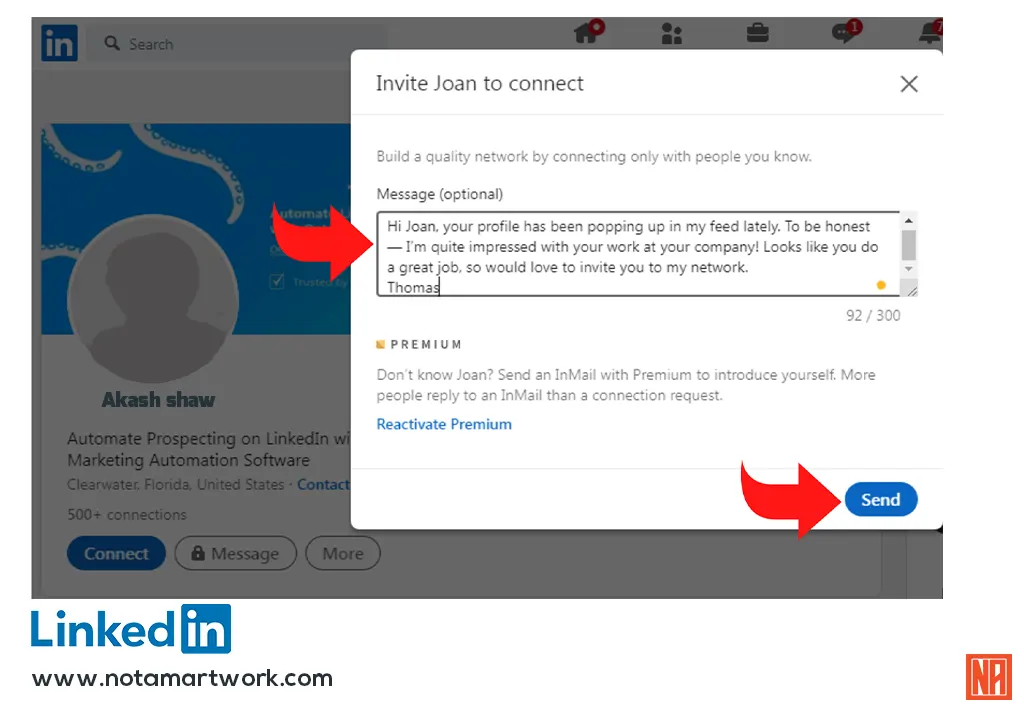
When responding to a recruiter on LinkedIn, being professional, courteous, and showing interest in the job is essential. Here are 10 sample messages you can use as a starting point:
1. Thank you for contacting me about the [Job Title] Position at [Company Name]. I’m very interested in learning more about the opportunity and would be happy to connect and discuss it further.
2. I appreciate your message regarding the [Job Title] role at [Company Name]. I am exploring new opportunities and would like to discuss the position further.
3. Thank you for considering me for the [Job Title] role at [Company Name]. I am excited about the opportunity and would love to learn more about the Position and the company.
4. I am interested in exploring the [Job Title] opportunity at [Company Name]. Please provide more information about the role and what you’re looking for in a candidate.
5. Thank you for your message regarding the [Job Title] role at [Company Name]. I am reviewing my options and would be happy to connect and discuss the opportunity in more detail.
6. I am excited to hear about the [Job Title] opportunity at [Company Name]. Please provide more information about the role, including the required skills and qualifications.
7. Thank you for contacting me about the [Job Title] Position at [Company Name]. I am impressed by the company’s mission and values and would like to learn more about the opportunity.
8. I am interested in the [Job Title] role at [Company Name] and would be happy to connect and discuss this further. Please provide more information about the responsibilities of the Position.
9. Thank you for your message regarding the [Job Title] opportunity at [Company Name]. I am reviewing my options and would like to learn more about the company’s culture and values.
10. I am interested in the [Job Title] Position at [Company Name] and would be happy to discuss the opportunity further. Please provide more information about the company’s employee growth opportunities.
Remember to customize your response to the job opportunity and company and highlight your relevant skills and experience. A professional and thoughtful response can help you make a great impression and increase your chances of landing the job.
Preparing for a Conversation with a Recruiter
Preparing for a conversation with a recruiter can help you make a great impression and increase your chances of landing the job.
how to research the company and job opportunity before speaking with the recruiter
LinkedIn is an excellent tool for researching the company and the job opportunity before speaking with a recruiter. Here are some steps to follow:
1. Look up the company: Use the search bar at the top of LinkedIn to search for the company. Once you find their page, take some time to read through their profile. Look at their About section, posts and updates, and any videos or other media they have shared.
2. Check out the recruiter’s profile: Look up the recruiter who contacted you and review their profile. This can help you understand their background and experience and any mutual connections you may have.
3. Look at job postings: Check out the company’s job postings on LinkedIn. This can give you a better understanding of the types of roles they are hiring for and the qualifications they are looking for in candidates.
4. Review employee profiles: Look for current or former employees of the company on LinkedIn. This can give you a better understanding of the company culture and what it’s like to work there.
5. Research industry news: Look for news articles or updates related to the company or industry. This can help you understand any recent developments or trends relevant to the company or the job opportunity.
By thoroughly researching the company and job opportunity before speaking with the recruiter, you can gain valuable insights and prepare yourself for a more informed conversation.
This can help you show your interest in the company and Position and demonstrate your knowledge and expertise in the field.
Tips for preparing questions to ask the recruiter
When preparing questions to ask a recruiter on LinkedIn, it’s important to remember that your questions should be focused, relevant, and show your interest in the company and the Position. Here are some tips to help you prepare:
1. Tailor your questions to the company and job opportunity: Make sure your questions are specific to the company and the Position you are applying for. Avoid asking generic questions that could apply to any company or role.
2. Ask about the company culture and values: Ask the recruiter to describe the company culture and values. This can give you a better understand of the company’s priorities and how they approach their work.
3. Inquire about the specific responsibilities of the role: Ask the recruiter to describe the day-to-day duties of the job. Having knowledge about your role will help you understand if the role is a good fit for your skills and interests.
4. Ask about the hiring process: Ask the recruiter about the timeline for the hiring process and what you can expect in terms of the next steps. This can help you plan your job search and follow up appropriately.
5. Inquire about the team and management structure: Ask the recruiter to describe the team you will work with and the management structure. This can help you understand the dynamics of the workplace and how decisions are made.
6. Ask about growth opportunities: Inquire about professional growth and development opportunities within the company. This can help you understand the potential for advancement and the company’s commitment to employee development.
By asking thoughtful, focused questions, you can show your interest in the company and the Position and gather vital information to help you make an informed decision about your job search.
How to respond to a recruiter on LinkedIn Salary
Suppose a recruiter reaches out to you on LinkedIn. You are interested in the Position but want to know more about the salary. In that case, you can respond with a message like this:
Hi [Recruiter Name], Thank you for reaching out to me about the [Position] role. I am interested in learning more about the opportunity. Still, could you provide me with more information about the salary range for this Position? I would appreciate any information you can share. It will help me determine if the role aligns with my salary expectations and career goals. Thank you for your time, and I look forward to hearing back from you. Best, [Your Name] Remember to be professional and courteous in your message, and avoid making demands or sounding entitled. Instead, approach the topic of salary respectfully and curiously. Also, remember that the recruiter may have different salary information and must check with the hiring manager or HR department before answering.
In conclusion, responding to a recruiter on LinkedIn is an excellent opportunity to learn about job opportunities and advance your career. It is important to respond professionally and politely and to take the time to understand the role and the company before making any decisions.
When responding to a recruiter on LinkedIn, personalize your message and adjust your tone and language to fit your style. Always express your interest in the Position and ask relevant questions about the role, company, or recruitment process.
Remember that recruiters are busy and may only respond after some time, so be patient and follow up if necessary. And finally, be respectful and courteous at all times, even if the role or salary does not meet your expectations.
By following these tips and best practices, you can effectively respond to recruiters on LinkedIn and potentially land your dream job. Good luck!

Hi, i’m Akash shaw creator of Adsvast agency , Hello, I am a perfectionist with deep love for aesthetics,
a graphics designer with expertise in logo design and branding.
My only goal with Notamartwork is try to help others to freelancers to get jobs and learn how to do freelancing.
